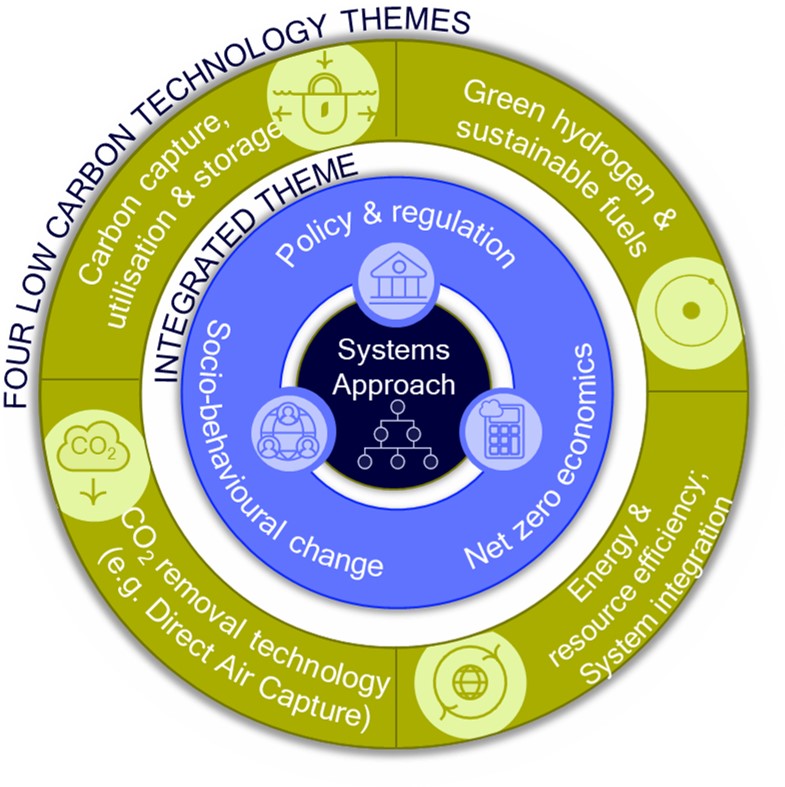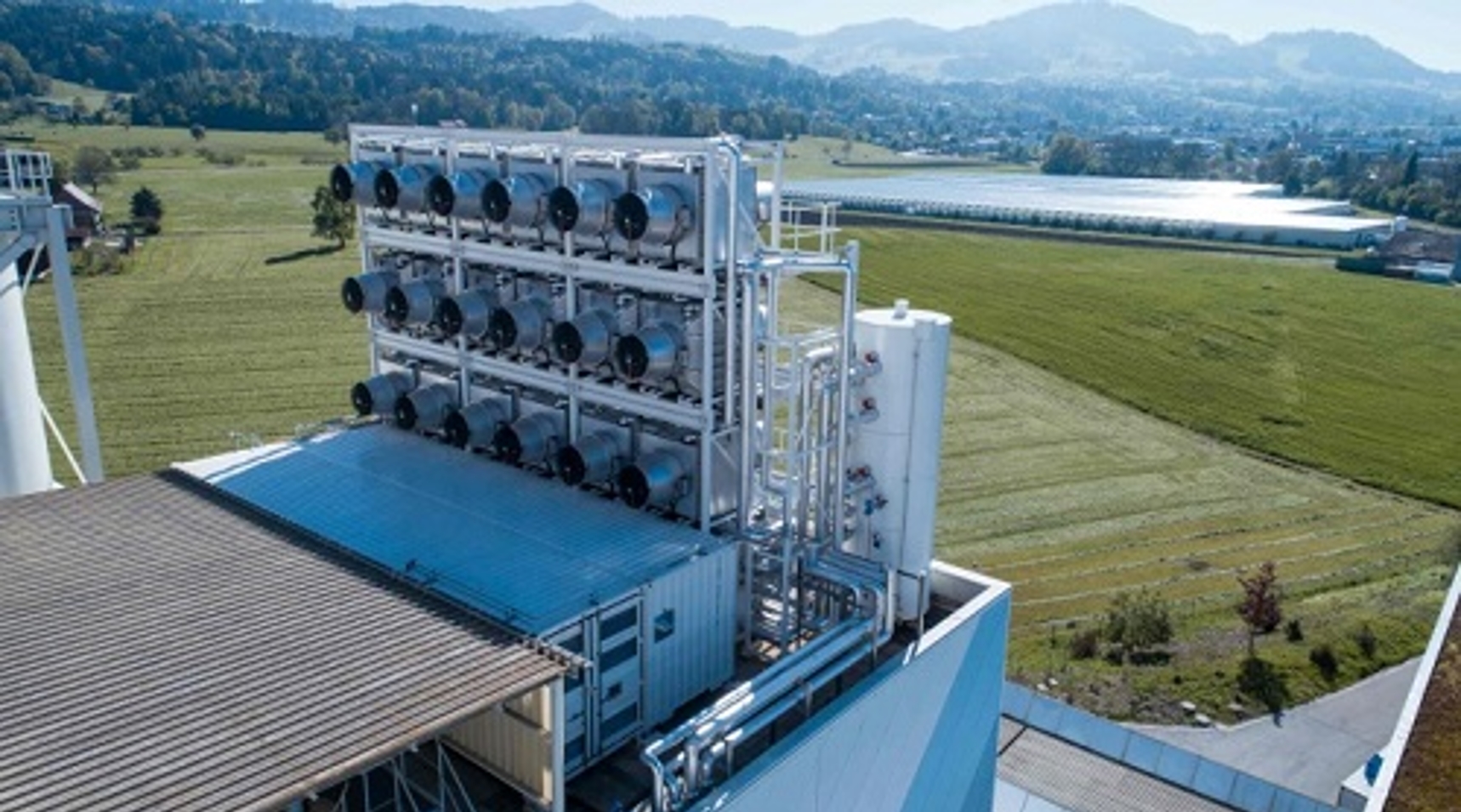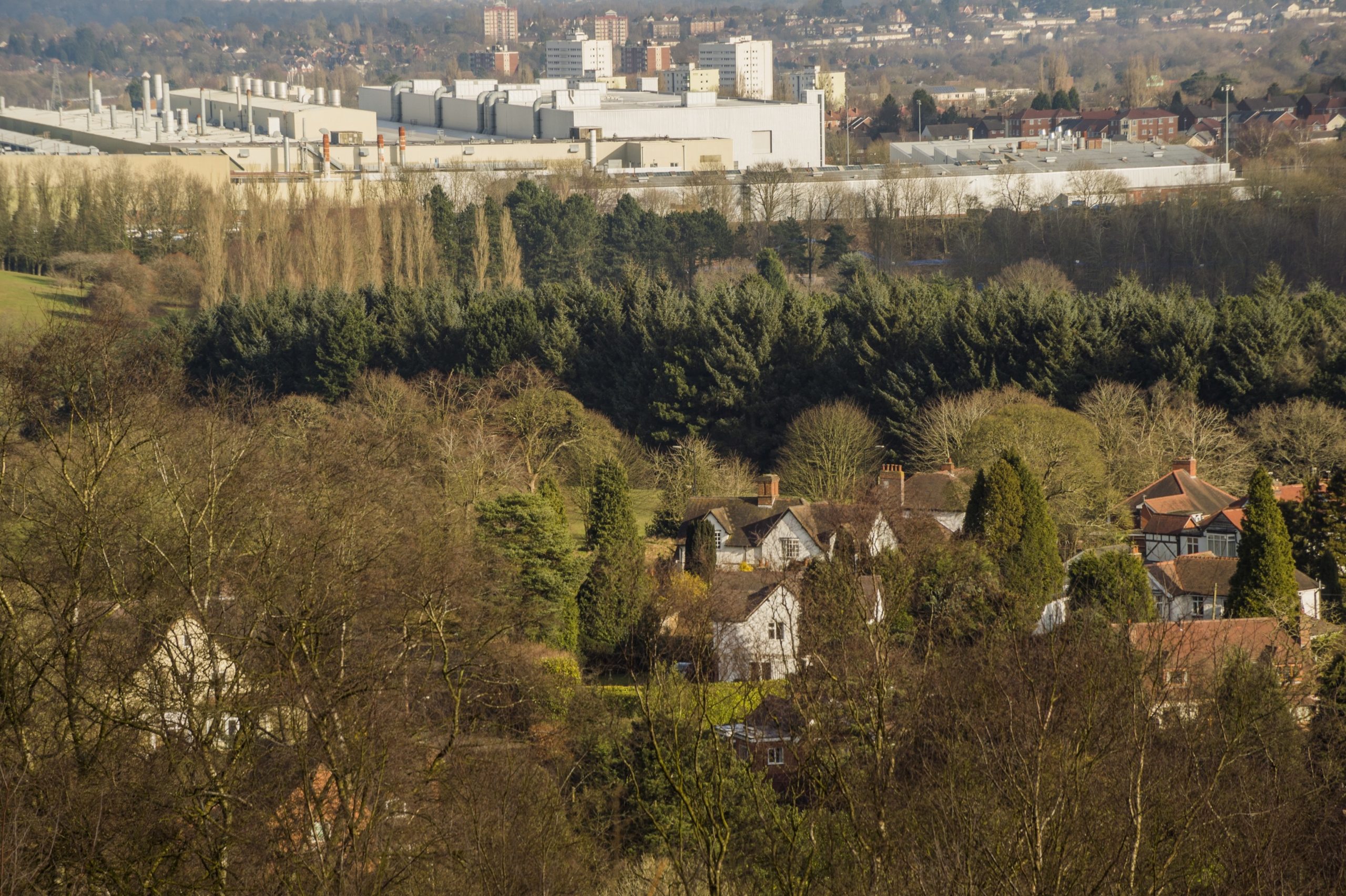We are offering pioneering research projects that will enable you to explore key technologies that will support UK industry to reach net zero. CDT in Green Industrial Futures has five research themes. Our students will develop expertise in their chosen research field, whilst also understanding cross-thematically how technologies integrate.


Advancing CCUS technologies
Advancing carbon capture, utilisation and storage technologies will push forward research frontiers in advanced materials and technologies for CO2 capture and utilisation from industrial sources and a range of socio-economic, engineering, and geological issues required to achieve the scaleup of CO2 storage to gigatonnes per year, particularly to unlock the UK’s potential as a regional European hub for CO2 storage.
Theme Leads: Professor Paul Fennell, Professor Mercedes Maroto-Valer, Professor Sam Krevor
Current project vacancies:
Lead Supervisor: Prof. Mercedes Maroto-Valer
Research field: Subsurface engineering
About the project:
This project focuses on establishing reliable, cost-effective, large hydrogen or carbon dioxide storage and distribution hubs. In collaboration with industrial partners, we aim to identify and reduce the hurdles for geological storage of hydrogen and carbon dioxide.
Supervisor: Prof. Susana Garcia
Research field: Chemical engineering
About the project:
This project will explore deep removal of CO2 from industrial sources (i.e., CO2 capture rates higher than 95%,) and will focus on the development and assessment of novel electrochemical-regeneration methods that can be coupled to amine-based carbon capture technologies.
Supervisor: Prof. Paul Fennell
Research field: Chemical engineering
About the project:
Project description
Supervisor: Prof. Paul Fennell
Research field: Chemical engineering
About the project:
Project description
Supervisor: Prof. Daryl Williams
Research field: Chemical engineering
About the project:
Project description
Lead supervisor: Professor Mathieu Lucquiaud
Research field: Chemistry/chemical engineering
About the project:
One key application of Carbon Capture and Storage technologies is the removal of carbon dioxide from industrial and combustion gases before they enter the atmosphere, e.g. from combined cycle gas turbine power plants, energy from waste plants and industrial facilities in cement, steel, chemical, glass, paper and ceramic. This project focuses on existing and emerging instrumentation techniques for the monitoring of CO2 capture solvent technologies. It is industrially relevant and is at the forefront of commercial deployment. Long term testing of solvents is now part of the guidance by the UK Environmental Agencies for the permitting of new post-combustion CO2 capture facilities.
Lead supervisor: Professor Mathieu Lucquiaud & Prof. Jon Gibbins
Research field: Chemistry/chemical engineering
About the project:
The project aims to design and optimise a novel concept for contacting the combustion gases of gas turbines with solvents used for CO2 capture. It uses a first of a kind prototype system to obtain experimental data, combine the data with process modelling and scale up towards a commercial design. A second application is the removal of carbon dioxide from the air, a core technology of a $3.5 billion US government programme to establish four regional Direct Air Capture hubs across the country.

Green hydrogen & sustainable fuels
This theme focuses on critical challenges on scaling up and integration of hydrogen and sustainable fuels into large energy systems. This includes the development and optimisation of novel materials and devices with high conversion & selectivity, long lifetimes & low cost, in combination with cost reductions in CO2 capture, particularly Direct Air Capture (DAC). This theme also addresses the challenges that arise from curtailed renewable energy, the utilisation of low carbon fuels and novel designs of equipment needed for difficult to decarbonised processes.
Theme Leads: Professor John Andresen, Professor Yannis Hardalupas. Professor Mohamed Pourkashanian
Current project vacancies:
Lead supervisor: Mercedes Maroto-Valer
Research field: Chemical engineering
About the project:
Large scale deployments of CCUS and integration with green hydrogen are a promising pathway to produce value-added chemicals and sustainable aviation fuels. This project aims to develop attractive commercial opportunities to produce marketable products by developing cost effective catalysts and optimizing the process through reactor design and life-cycle assessment.
Lead supervisor: Sudhagar Pitchaimuthu
Research field: Chemistry/chemical engineering/materials science
About the project:
The project focuses on the development of cost-effective electrocatalysts derived from non-critical raw materials, aiming to replace expensive platinum group metals in the electrolysis process. Emphasizing environmental responsibility, it contributes to the advancement of renewable energy technologies. Ultimately, the research aims to utilize wastewater as a valuable electrolyte feedstock for green hydrogen production, promoting environmental sustainability and energy innovation.
Lead supervisor: Prof. Yannis Hardalupas
Research field: Chemical engineering
About the project:
Project description
Lead supervisor: Prof. Anna Chatzimichali
Research field: Chemistry/chemical engineering/materials science
About the project:
The transition towards sustainable energy sources has placed hydrogen energy at the forefront of research and development initiatives worldwide. Hydrogen, as a clean and versatile energy carrier, holds the promise of significantly reducing our carbon footprint. However, the success of hydrogen energy relies not just on technological advancements but also on its acceptance and use by end-users. User-facing hydrogen products such as portable hydrogen storage solutions, are pivotal in integrating hydrogen energy into the daily lives of consumers. Despite the technological readiness of many hydrogen solutions, there remains a substantial gap in understanding the specific needs, preferences, and acceptance criteria of potential users. This gap hinders the widespread adoption of hydrogen technologies and limits their impact on our energy transition goals. Thus, this research work aims to bridge this knowledge gap by focusing on identifying and analysing user facilitating the design of more user-centric hydrogen energy solutions.
Lead supervisor: Prof. M Pourkashanian, Dr K Hughes, Dr E Alborzi, Mr I Ahmed
Research field: Chemistry/chemical engineering
About the project:
This project holds significant importance for the aviation industry and environmental sustainability efforts. By assessing non-CO2 emissions from sustainable fuels, the project aims to provide crucial insights into the potential benefits and environmental impacts of alternative fuels. The findings will contribute to the development of cleaner aviation technologies and policies, enabling the reduction of emissions and mitigating the industry’s carbon footprint. The project aimed at assessing non-CO2 emissions from sustainable fuels, specifically focusing on particulate matter (PM) and gaseous emissions. The project will involve experimental testing of emissions from an Auxiliary Power Unit (APU) using different Sustainable Aviation fuels and loading conditions. Additionally, the project will develop models to analyse the interactions and potential impacts of these emissions at various altitudes, including contrail formation and growth.
Lead supervisor: Prof. Lin Ma, Dr Kevin Hughes
Research field: Chemistry/chemical engineering
About the project:
Supporting fuel switching to hydrogen in industrial applications is high on the government’s agenda for decarbonising the heavy industrial sector. This PhD project aims to investigate the unique temperature combustion behaviours and emission characteristics, in particular NOx production in the combustion of hydrogen and blends with natural gas fuels. Hydrogen combustion kinetics and NOx generation models will be studied for accurate modelling of hydrogen combustion using CFD. The project will provide critical insights for the industry to mitigate risks and uncertainties associated with transitioning to hydrogen, supporting the broader goal of industrial decarbonisation.
Lead supervisor: Dr Kevin Hughes, Prof. Lin Ma, Prof. Mohamed Pourkashanian
Research field: Chemistry/chemical engineering
About the project:
Given concerns on the combustion of fossil fuels and the associated greenhouse gas emissions, their elimination is actively being sought. In some cases however there is a continuing need for combustion in industries where onsite combustion is essential, such as steel manufacture. In these cases, hydrogen has positioned itself as the ideal fuel to phase out carbon emissions given its zero-emissions and high heating value. However, despite these advantages, hydrogen has significant barriers in the form of safety, storage, and ease of transportation. Therefore, chemical hydrogen carriers have been identified as an alternative to the direct use of hydrogen. Transforming hydrogen into ammonia at the point of synthesis would reduce the pressure and temperature requirement whilst improving safety. The current drawback to this is the energy cost of the dehydrogenation step and that the conversion of ammonia is only partial, leading to some ammonia and a certain amount of nitrogen remaining in the fuel. This project aims to improve the understanding of the burning of hydrogen/ammonia/nitrogen blends by the use of a high-pressure shock tube facility to measure ignition delay time as a function of temperature and pressure of various fuel mixtures. In addition, laser diagnostics based on absorption spectroscopy are used to measure intermediate radical time evolution profiles. These experiments will provide data to enable the validation and enhancement of chemical kinetic models of ammonia/hydrogen blend combustion, to be implemented in ANSYS Chemkin-Pro. The outcome will be better chemical kinetic models to give an enhanced understanding of the actual combustion behaviour of hydrogen/ammonia/nitrogen fuel mixes.

Next generation CO2 removals
Developing next generation CO2 removal technology (CDR) generates novel understanding of the fundamental mechanisms underlying DAC, ocean alkalinity enhancement, accelerated weathering, Bioenergy with Carbon Capture and Storage (BECCS), Biomass Carbon Removal and Storage (BiCRS) technologies, and uses this to develop next generation CDR solutions. It includes developing state of the art methods for materials characterisation, fit-for-purpose model development combining first principles and empirical modelling with machine learning and a systems architecting approach to technology design.
Theme Leads: Professor Lin Ma, Professor Mijndert Van der Spek
Current project vacancies:
Lead supervisor: Mijndert van der Spek
Research field: Chemical engineering
About the project:
Large scale direct air CO2 capture may be needed to counter greenhouse gas emissions from so-called ‘hard to abate’ sectors (aviation, agriculture, certain industrial activities). Some estimates suggest that more than a gigatonne of CO2 needs to be removed from the atmosphere by 2050. To minimise energy use of such volumes of DAC, clever integration with industrial and energy systems is needed. This project combines solid-sorbent DAC process modelling with energy and industrial systems modelling to develop least energy, least cost DAC deployment scenarios.
Lead supervisor: Phil Renforth
Research field: Civil/chemical engineering, geoscience
About the project: Concrete is a fundamental building material essential to economic development and a substantial contributor to greenhouse gas emissions during its production. Concrete reacts with atmospheric CO2 in all parts of its life-cycle (during use, following demolition, and subsequent use). Accounting for passive CO2 uptake during the service life, and maximising uptake following demolition, together with deep emissions reduction in the production of cement could result in a net negative CO2 emission during its life-cycle. This PhD project will explore this vital in-service life carbonation of concrete and its possible use for creating a net-negative carbon footprint.

System integration
With the themes above, the system integration theme develops effective ways to integrate solutions considering site-specific industrial symbiosis, energy and resource efficiency and assessment studies for fuel switching. This includes integrating process modelling, techno-economic and life cycle analysis (LCA) to support the net-zero production of base/platform chemicals and fuels. These assessments will use prospective and consequential methods so solutions are assessed for their current and future performance and the wider system. Novel advanced optimisation and value models will be coupled to a superstructure approach to design energy-materials-technology pathways to achieve net-zero manufacturing at minimum cost.
Theme Leads: Professor Marcelle McManus, Professor John Andresen
Current project vacancies:
Lead supervisor: Prof. John Andresen
Research field: general engineering/systems analysis
About the project:
The candidate will work closely with industry to develop digital twin solutions for incorporating renewable energy options in industrial clusters, such as hydrogen, batteries, solar, wind and heat-pumps, for deep decarbonisation.
Lead supervisor: Prof. Marcelle McManus
Research field: general engineering/systems analysis
About the project:
An opportunity to explore and advance novel decarbonisation solutions for high-energy use industrial sites, with a specific focus on dispersed sites outside of government-supported cluster areas.
Lead supervisor: Prof. Marcelle McManus
Research field: software / systems engineering
About the project:
Are you interested in shaping the future of sustainable fuel infrastructure? We are offering a unique PhD opportunity to explore and model the whole system behind low carbon fuel technologies, focusing on the often-neglected infrastructure required for safe and reliable fuel delivery.
Lead supervisor: Prof. Lenny Koh and Prof. Mohamed Pourkashanian
Research field: Engineering disciplines / Data science /Social Science
About the project:
The green industrial futures depend on a sustainable and resilient resource supply chain to achieve the net zero goal. This project aims to develop a new approach to future proof energy and materials feedstock resilience for sustainable aviation fuels supply chain. The dual effects of sustainability and security of energy and critical materials supply will underpin the model development. It will involve a paradigm shift which combines geo-spatial-temporal modelling, prospective life cycle analysis, techno-economic assessment and AI methodologies. It will map and analyse the sustainable aviation fuels supply chain beyond organisation and embeds embodied/hidden layer of direct/indirect dependence and closed-loop/circular relation in the value networks at multi-tier. Primary data will be derived from TERC, SAF-IC, IDRIC and industry partners. Co-developed with partners, future scenario for SAFSC will be examined across 2030, 2040 and 2050 via various technological pathways and fed into industry and policy decision making.
Lead supervisor: Prof. Lenny Koh
Research field: Engineering disciplines / Data science /Social Science
About the project:
Both carbon removal technologies (a.k.a. negative emission technologies) and hydrogen (especially green) will play a key role towards achieving the net zero commitment. A mixed level of maturity of these technologies, supply chain dependency on imported resources, energy content, climate and energy policies variation have led to the dual challenges on scale up viability and global standardisation. This project aims to unpack the integrative systemic and symbiotic effect of CDR and H2 on operational, economic, social, behavioural and environmental performance. Advanced modelling and comparative assessments will identify optimum systems combination leading to a resource efficient outcome. A new model and framework will be developed for the scale up and standardisation of integrative systems of CDR and H2.

Integrated theme (social, environmental, economic and political)
Critical to the success of a green industrial transition is uptake and use in industry and society. Working across the themes, this theme applies cutting-edge social science and behavioural insights to ensure a people-based focus. Research projects will address evidence gaps, understanding what is required for net zero-consistent behaviour change in industry and society and testing mechanisms for transformative changes. We will apply an expanded concept of behaviour change to include people’s professional, consumer, citizen and community roles, and assess underpinning policy and regulatory frameworks linked with systems integration to understand the complex challenges posed by net zero.
Theme Leads: Professor Lorraine Whitmarsh, Professor Mijndert Van der Spek
Current project vacancies:
Lead supervisor: L Whitmarsh and S Hampton
Research field: Software / Systems Engineering
About the project:
There are more than 5.5 million Small and Medium-sized Enterprises (SMEs) in the UK, accounting for around half of business emissions. However, there is no common process for reporting emissions, and only a small proportion of SMEs (<10%) have ever calculated their carbon footprints. Lack of quality data prevents the effective management of carbon emissions amongst businesses. If data could be gathered at scale, they could generate insights to help businesses and financiers to make informed decisions about investments in energy efficiency measures and low-carbon technologies.
Lead supervisor: Prof. CD Demski & Prof. L. Whitmarsh
Research field: Psychology
About the project:
A successful green energy transition requires support from the public and developers need a social license to operate. Research has investigated how local and national communities engage with net zero energy developments, such as carbon capture and storage, and found that there remain groups whose voice is seldom heard in decision-making. These under-served and marginalised communities are likely to be more exposed to technical and environmental hazards, while simultaneously having less power to mitigate the risks. This project will identify how to provide a more substantive role for marginalised (e.g. low-income, diverse ethnic minority groups) communities in decision-making about decarbonising industry, at both local and national levels.


